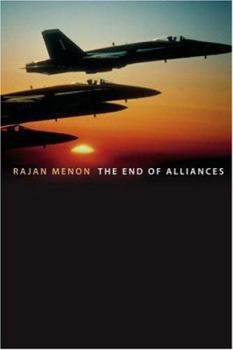The End of Alliances
Select Format
Select Condition 
Book Overview
Why should the United States cling to military alliances established during the Cold War when the circumstances are now fundamentally different? In The End of Alliances, Rajan Menon argues that our alliances in Europe and Asia have become irrelevant to the challenges we face today. The United States must be actively involved beyond its borders, but by relying on coalitions whose membership varies depending on the issue at hand. While a strategy that ceases to rely on alliances will mark a dramatic shift in American foreign policy, he reminds us that states routinely reassess and reorient their strategies. The United States, which studiously avoided alliances for much of its history only to embrace them during the Cold War, is no exception. The End of Alliances predicts that the coming change in American strategy will force our traditional allies to rethink their choices and create new patterns in world politics. The controversial argument advanced by Menon will provoke debate among foreign policy specialists and the general public.
Format:Hardcover
Language:English
ISBN:0195189272
ISBN13:9780195189278
Release Date:March 2007
Publisher:Oxford University Press
Length:280 Pages
Weight:1.18 lbs.
Dimensions:0.9" x 6.4" x 9.3"
Customer Reviews
2 ratings
Leaving Plato's Cave
Published by Thriftbooks.com User , 17 years ago
I thoroughly enjoyed this book. It presents new and exciting theories on foreign policy which diverge from the hegemonic view point that we all hold of the U.S. and its alliances. People always expect the U.S. to turn to NATO and other western countries for help while we should be creating alliances tailored to specific problems. Dr. Menon's book causes anyone interested in politics or international relations to open their eyes and ears to new strategies and foreign policy. I am currently taking a class taught by Dr. Menon at Lehigh University and he is definitely one of the most well educate people that I have ever met. Having read the book before taking his class, I know hold even more respect for his theories and opinions since I have begin studying under him.
The future of US foreign policy?
Published by Thriftbooks.com User , 17 years ago
Rajan Menon attempts a very ambitious project in this book and raises some thought provoking questions. The idea of why the United States remains in NATO is a question that is not asked often enough. Menon raises an excellent point in asking should the United States have ever formed NATO in the first place. Military alliances are not a natural extension of containment and the policy was based on economics. NATO's role in the post war world lacks focus and the alliance was not meant to go beyond the European continent. While there was some success during the Balkan crisis's the growing role of the EU as opposed to NATO is something that is worth considering. It is a group of countries and not NATO that are showing themselves to be the most useful allies in the war on terrorism. France and Germany have served as detractors opposed to US policy leading to a question of how well the NATO alliance will succeed. In addition to the questions about NATO Menon also explores how the US relationship with Japan and South Korea are in need of reevaluation. Both of these countries are now economically self sufficient and do not need the United States for defense. While South Korea is at risk from an attack by North Korea there is little that the presence of United States soldiers will do to tip the balance. The need for redeployment of forces to Iraq will force the United States to reevaluate both of these relationships. These analysis points are right on target. Japan and China will have to work out a new balance of power system that will allow them to look at their place in the world. It will be a system that the United States will not factor into within the region. The biggest drawback to this book is that it does not go far enough. It would have been interesting to see these subjects explored in greater detail however the five stars are still earned because the points are original and there is enough detail to start. Menon does a masterful job of organizing and presenting his topic. It is an excellent look at how the future of United States foreign policy may have to be conducted based on our past experiences. This is well worth the time for anyone interested about America's place in the world to read.






